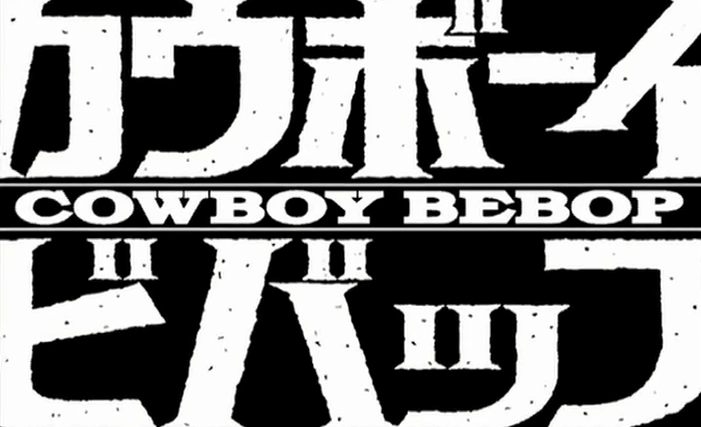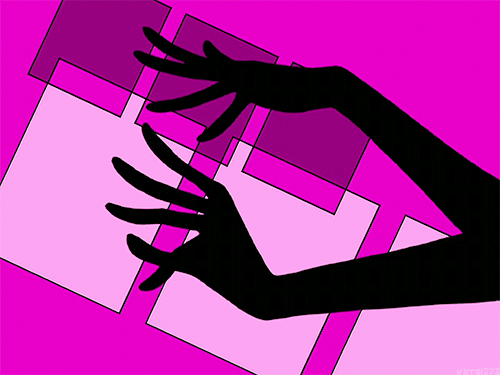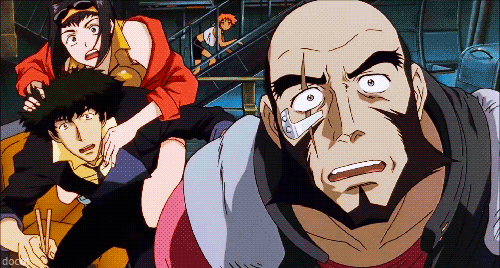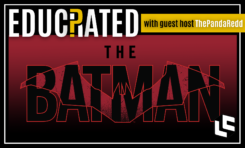Welcome to the final part of our three part interview with Beau Billingslea, Wendee Lee, Paul St. Peter, Marc Handler, Mary Claypool, and Les Claypool III. We sat down with them at a local anime convention Anime Los Angeles where they were celebrating 20 years of Cowboy Bebop!
If you missed the beginning of the interview please check out Part 1 and Part 2.

(Sunrise)
Les, you’ve done a lot of sound work. What brought you into the world of bringing Japanese animation to an English speaking audience?
Les Claypool: In a nutshell I was approached by Ken Iyadomi while I was working on a movie called Kung Fu Rascals and asked me to work on a project but I was just too busy. After I finished that movie he called me back because they were having such a hard time and asked me to help with this thing called Japanese animation. So Kevin Seymour, Yutaka Maseba, Ken Iyadomi, and Bob Napton all showed up at my garage studio in 1992. That’s where we started and we just started dubbing and none of us knew what we were doing. From there is just slowly progressed until there were multiple studios, multiple locations, and multiple rooms.
Mary, Japan can have vastly different cultural tones from the USA. How did you go about adapting the script to make it work for an American audience?
Mary Claypool: I’m provided a translation and very often the script I am provided is based on how well it’s translated. Some translators are very good at not just doing the literal translation but changing that over into a more idiomatic understanding of what we may not understand in Japanese or whatever the original language is. Other translators are very literal and we really have to work with that. It’s a matter of whether or not the rights holder will allow me to run with some of it and have some free license to change it without compromising the plot or the character or do we have to adhere very closely to the translation. It can be difficult when they are so adamant that we do that so it can come out very stilted, stiff, and not make much sense to an audience that is in America. When they allow us to localize it and adapt it for the demographic of the audience it makes my job a lot easier. I can use expressions that are common here and then the rest is mechanics of trying to make it fit while writing it with the hieroglyphic notations for the actors.
Les, what is your favorite song in the show?
Les Claypool:I love the opening credit song. When mix engineers are mixing shows we do not sit there and listen to the opening credits every time we mix a show. We print it and move on and get to the meat of the show because time is money in the studio. Well… when we were doing all the 5.1 remixes we listened to that opening song every day, multiple times a day, and every time we had to print it we listened to it and we were all just rocking out and loving it. I came to Bebop late. It was already popular when I came on to do the remixes but that was the first thing that hit me when I came to the show and I said “Whoa! That’s some great music in this show!” and that opening credit is just cool.

(Sunrise)
Marc, you worked on the movie as well. What was it like bringing a beloved series back to life?
Marc Handler: It was terrific and it felt like a natural thing to happen. We lived with those characters and we felt like it should go on. The idea that it would go into a movie was natural. I’ve always been expecting, and I’m still expecting for it to be turned into a live-action movie. The nice thing is that it was done by the same people. Our fear was that because it was a film and the distributers were such big companies that they would work with new people. I think they were considering that at the beginning and we met with them and had to convince them to go with us. To their credit they did end up working with the same group. It was really positive to be able to work with the same group who already knew the show. The advantage over the series was that we had much more communication with Japan by that time. When we worked on it and we had questions about the story or characters we were able to ask the creators in Japan directly. We were so clued in an able to do the best possible version. This was Watanabe-san’s show and the credit goes to him and the Japanese creators and they are terrific. All we did was take their work and bring it to an American audience. I’m proud of the work we did and all of our group were great talents and I felt very privileged to work with them.

(Sunrise)
You’ve also written for live action titles like Power Rangers. What are some key differences between working on animated series vs a live-action?
Marc Handler: Power Rangers is a different animal. It’s different because it’s partially footage from the Japanese show and you create new scenes with the American cast to fill it in. I worked on different seasons with different story editors and producers. James Bates was my main story editor and he was absolutely terrific but when I worked with different people we had different marching orders. The story we were creating didn’t always match up with the footage we had and we were starting from scratch. Sometime Is had the negative experience of looking at footage from Japanese culture that is really cool. For example there was one where a samurai was just looking for a strong opponent. It was very Japanese and very cool. Then they would say they didn’t want to do that for the American version because they wanted to do something that was more American and that was very frustrating.

(Sunrise)
There of anime geeks here at this convention but what do you geek out on the most that is not anime?
Paul St. Peter: Buffy the Vampire Slayer, Kung Fu (The original show from 72 – 74 with David Carradine), and films I can go back to again and again. Films like Young Frankenstein, Predator, and a British romantic comedy called Four Weddings and a Funeral. I get out over things like that.
Les Claypool: I have a couple good geek outs. One of them is my favorite episode of the original Star Trek with Apollo in it. Kevin Seymour one day told me that this actor named Mike Forest was coming in to do some voice over for anime. He played Apollo in my favorite Star Trek episode! I was like a little kid in a candy store saying “Mike Forest is coming!” So I ran out and bought a VHS tape of that episode and had him sign it. One of the things we grew up with was Ray Harryhausen movies and our daughter grew up on them. We just thought Ray Harryhausen was a god because he was doing all of our favorite movies. Somehow or another we ended up at a revival screening with our daughter watching Mysterious Island and Jason and the Argonauts and Ray Harryhausen was in the audience with his family a couple rows down and that was another head explode moment.
Wendee Lee: Oh I geek out on a lot! I am into ancient Egyptian archeology and symbology. I’m into a lot of alternative science and I’m kind of a science geek. I love working with crystals and semi-precious stones. I have a rich relationship with Mother Earth, paganism, and shamanism. My mother is 3/4th Native American so I’ve been raised to hone intuition and work with nature. The healing arts are a big part of my interests and hobbies as well as clean living and ecology. I’m really kind of a nature kid. I’m into hiking, spending time in nature, gardening, and growing my own veggies and herbs. Whenever I’ve met any of the people that I admire I become exactly the kind of fan that we have here today. I basically turn into a little girl and squeal. I love rock icons and I’m madly in love with Peter Gabriel and I love him more than anyone else in his life. My husband understands and tolerates it. I just have a lot of interests so I’m not a person who ever gets bored easily.
Mary Claypool: I really geek out on old science fiction movies. I love them so much! My favorite movie of all time is Aliens and my second is Carpenter’s remake of The Thing and I’ve seen them both like a thousand times. I love it and quote it constantly. I also figure Aliens is the ultimate chick flick so I love it!
Beau Billingslea: My grandkids. I don’t know if that’s an appropriate answer but my family is so important to me and it’s such an important part of my life. I’m just so blessed to have three grandkids that are living in the same area I do. I get a chance to go to the park, play games with them, and trick them! I even get tricked by them too! That is the center of my life.
Marc Handler: I was a baseball card collector when I was a kid. I played baseball, ate, drank, and slept baseball. I still have my baseball collection and don’t mess with my collection! I totally nerd out about baseball at that time. I don’t still follow it but I am able to go back to it when I look at my baseball cards from when I was a kid and nerd out on it still.




